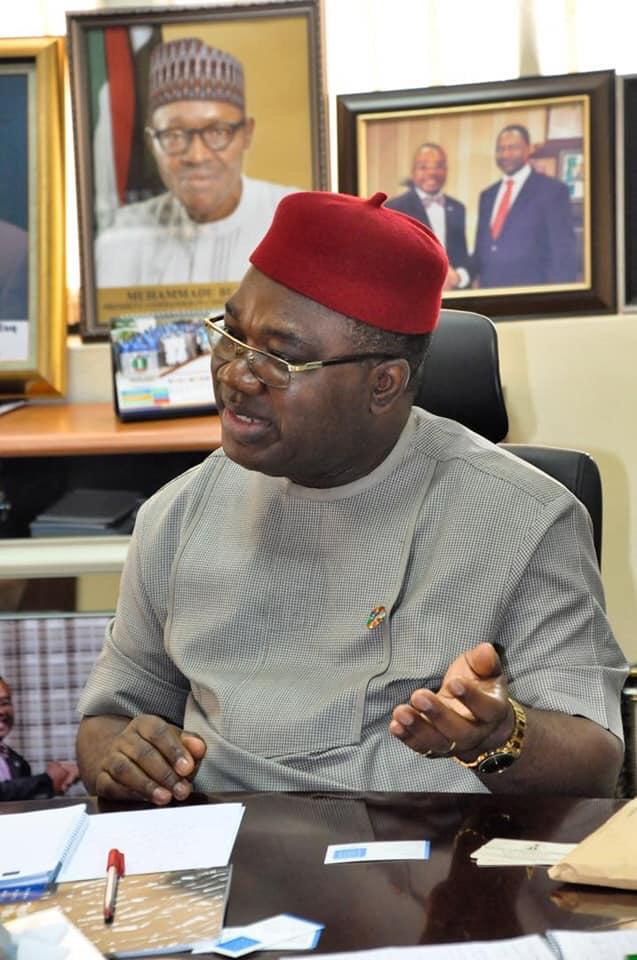The National Human Rights Commission (NHRC) has called for more inclusive political participation in Nigeria saying that denying women and the disadvantaged group the opportunity to fully participate in politics will continue to impact negatively in the nation’s democracy.
Executive Secretary of the Commission, Tony Ojukwu Esq who made this call in Abuja Monday at the 2019 UN International Day of Democracy Conference organized by Initiative for Citizens’ Rights, Accountability & Development (ICRAD) in collaboration with NHRC observed that sustainable electoral reform and voter education targeted at supporting women and the disadvantaged group into elective positions of governance, will go a long way to add value to governance.

Ojukwu said women and the disadvantaged group are very critical in the nation’s democratic journey but regretted that factors like electoral violence, vote buying, inducement and other electoral malpractices have combined to pose serious challenges to the political aspirations of this vulnerable group.
According to the Executive Secretary, Citizens’ participation in democracy is a fundamental human right and a critical aspect of democratic and electoral process which is well entrenched under International and Regional Human Rights Law. “Article 21 (1-3) of the Universal Declaration of Human Rights, Article 25 of the International Covenant on Civil and Political Rights and Article 13 of the African Charter on Human and Peoples’ Rights all recognize the right of everyone to participate in the government of his or her country either directly or through a freely chosen representative”, Ojukwu stated.
He also identified intra-party strife, lack of political ideology, poverty, insecurity, illiteracy/lack of civil education, weak
institutions, opposition intolerance and electoral malpractices such as ballot box snatching, disruption of elections in key opposition strongholds, resort to violence, killings of opposition members, kidnapping of electoral officers and manipulation of electoral results etc as the challenges facing the nation’s democracy.
In his welcome address, the Executive Director ICRAD, Hassan Luqman Esq said that the theme of this year’s commemoration, “The relationship between Participatory Democracy and Credible Elections towards ensuring Sustainable National Development” is apt given the increasing need to improve on the nation’s democratic process.
According to the Executive Director, it is a challenge that many Nigerians are periodic participants in the democratic processes of the nation and these categories of persons wait for the electioneering period, take part in the campaign and cast their votes.
He noted that there is need for the electorates to follow up the mandates given to their elected representatives and care about what the ruling party does with its manifesto so as to achieve good governance.
In his remarks, Sultan Maccido Institute for Peace, Leadership and Development Studies, University of Abuja, Associate Prof. Mutiullah Olasupo said that election stakeholders like the conventional and
social media, government; election management body, political parties, candidates and the electorates have critical roles to play to ensure a smooth and credible election.
In his topics, “The Critical Role of Stakeholders in Building Confidence in Nigerian Electoral Process, the Academic expert opined that if the electoral body and the civil society are empowered to the
extent that they are encouraged carry out their respective duties within the confines of the law, the system will become more sanitizer with improvement in electoral outcomes.
In his statement, the Pro-Chancellor and Chairman of Governing Council, Federal University of Petroleum Resources, Effurun, Deltavstate, Prof. Shehu Abdullahi Zuru said that it is unfortunate that Nigeria has been variously described by some international citizens as well as representatives of leading democracies in the world in despicable manner, for instance, he quoted the former President of South Africa, Nelson Mandela as describing Nigeria as, “the sick man of Africa”. He advised that democracy is not about form but rather about trust, about integrity, about responsibility and character while insisting that “the country must conquer poverty before it could build architecture of participatory democracy anchored on service and integrity that will have cascading impact on every facet of our
national life”.
